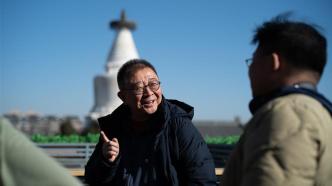
On October 27, the latest film "The Light of the White Tower" by Chinese Korean director Zhang Lu officially met the audience on the big screen. This is also his second solo work released in the mainland after "The Long Confession" last year. This elder, who has just passed his sixtieth year, has switched from being a scholar and novelist to making films since the new century. He started with his debut short film "11 Years Old" (2001). So far, more than ten works have been published, becoming a A frequent visitor to major international film festivals, he has won numerous awards.
"The Long Confession" starring domestic stars brought Zhang Lu into the eyes of mainland audiences for the first time, and his success in winning the best small and medium-budget feature film and the best supporting actor (Xin Baiqing) at the China Film Golden Rooster Awards last year, It also greatly increased the exposure of the new work "The Light of the White Tower" and Zhang Lu himself. Since its debut in the main competition of the Berlin International Film Festival at the beginning of the year, the film has won five awards at the Beijing International Film Festival, including Best Actor and Best Screenplay, and won five awards at the 10th Beijing International Film Festival. At the Silk Road Film Festival, it won two awards for Best Film and Best Cinematography. It can be said that it is hot before it is released.
"Wandering between different countries, ethnic groups, languages and cultures, Zhang Lu's films present a landscape of collision, dialogue and blending between motherland and hometown, individuals and ethnic groups, diaspora and locality, creating a The screen construction of a new ethnic identity." This is the past academic evaluation of Zhang Lu's films. Looking at the titles of his works, one obvious phenomenon is that he often places the camera in a certain area in China, South Korea, and Japan, and uses this specific geographical space to lay out different ethnic groups, countries, and languages. The story of an individual’s life with a cultural community.
Some people have tried to divide Zhang Lu's creation into stages, and used his move to Seoul, South Korea in 2012 as a dividing line to examine his cross-regional creative trajectory between Yanbian, Beijing (where his family lives) and Seoul from two stages. . From this point of view, this new work, named after the White Tower, a historical and cultural landmark in the capital, is the first time in his more than 20 years of video travel that he has completely anchored his lens in Beijing, where he has lived the longest. city of.
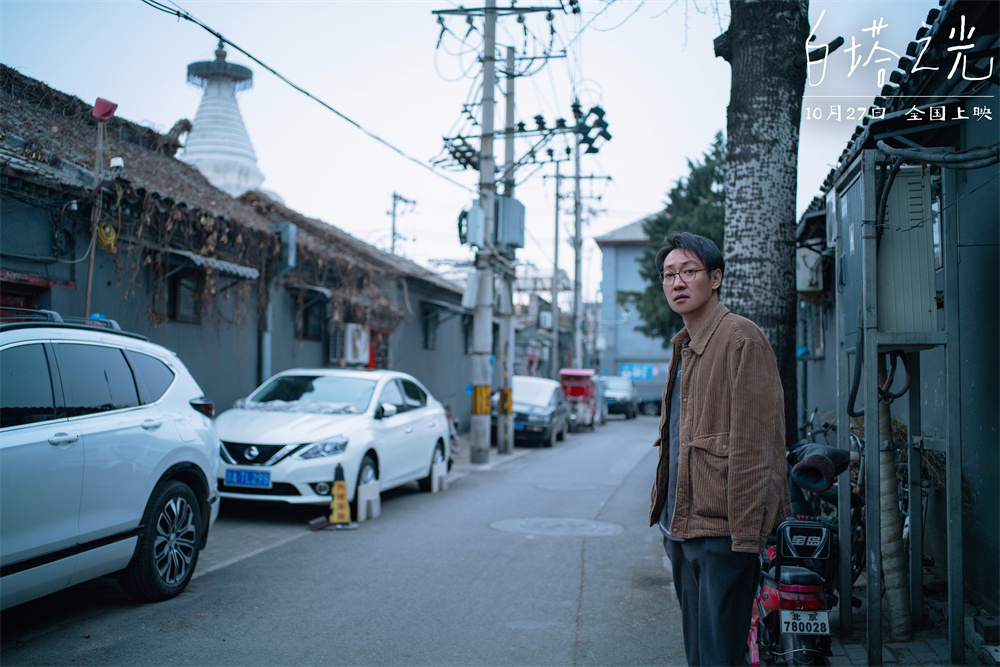
Stills of "The Light of the White Tower", Xin Baiqing at the entrance of the alley
Some viewers commented after watching "The Light of the White Tower" that the real protagonist of the movie is actually Beijing. The traces and taste of Beijing are everywhere in the film, with characters wandering in the streets and alleys, steaming braised pork, spicy Erguotou, pigeon whistles passing through the air, and men playing chess on the street.
Just as the film's English title "The Shadowless Tower" conveys the Zen concept, the ambiguous emotional entanglement between the male and female protagonists, the unresolved grudge between father and son, all are common clichés in various types of narratives. It was broken one by one, and there was no clear explanation until the end of the film. Instead, the scattered fragments were used to weave a series of thought-provoking puzzles... With these questions, The Paper reporter recently interviewed Director Zhang Lu in Beijing.
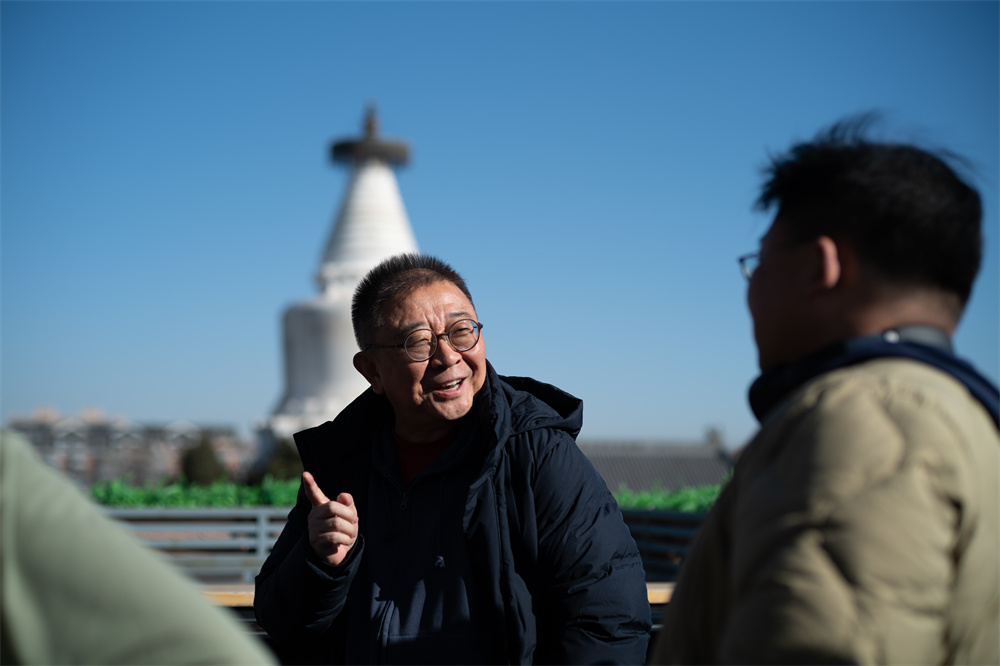
Director Zhang Lu on the set
【dialogue】
"No matter how peaceful the place is, people's emotions still have ups and downs."
The Paper : Compared with the commercial nature of your movie "The Long Confession" released last year, the authorship of "The Light of the White Tower" is still more obvious. What do you think?
Zhang Lu : I don’t realize any changes in my creation at all. Maybe it’s because the audiences who watch my movies have different tastes. I make movies entirely at my own pace.
The filming of "Light of the White Tower" happened during the epidemic. I returned to Beijing from South Korea and was quarantined in a hotel in Guangzhou for 14 days. Beijing is my return destination, so naturally I wanted to write a script with Beijing as the direction, so I thought of the Xisi area and the Baita Temple. In these 14 days, I wrote the script.
When I was young, I often played near the Xisi White Tower. To this day, if I am in Beijing, I often go to the Yanji Cold Noodles restaurant at the east entrance of Xisibei Ertiao, which has been open for more than 30 years. That noodle restaurant is amazing. The first cold noodles that Beijingers eat is theirs. (laugh). So I am very familiar with the space in that area. The north side of Xisi North Street is basically the same as it was when I was young, while the south side of the road has undergone earth-shaking reconstruction.
The Paper : Many of your past films have been titled after a city. Beijing is the city where you have lived the longest. Why didn’t you take pictures of it until now?
Zhang Lu : Yes, one reason is that I am not good at naming movies. Another point is that I had to rely heavily on that space to make that movie. All my films are created from the perspective of space, and there is no planning. I just happen to have a feeling for a space and shoot it.
Because Beijing is the place where I have lived the longest, I have been here since the 1980s, and I always feel that there are plenty of opportunities to take pictures. I have lived here for too long. Although Beijing is not my hometown, it is difficult for me to take pictures of Beijing with the mentality of a tourist. If I want to shoot, it will definitely be about Beijingers. Of course, I will also include some outsiders. This is the real urban life in Beijing. Another point is that Beijing is a very difficult city to photograph.
The Paper : What do you think is difficult to photograph?
Zhang Lu : The city of Beijing is very flat in terms of space. Generally when filming a movie, when the scenery is good, I like to find a well-proportioned place that is easy to work on. Why does everyone go to Chongqing to film movies? It’s because the mountain city is high and low and well-proportioned. Beijing is very flat in space, which is a problem in visual presentation. Then you really have to look for the story from people's emotions - no matter how flat the place, people's emotions will have ups and downs, but how to combine the character clues and the geographical space? This is a point that has troubled me for a long time.
I have lived near Xishiku Church for many years, and it only takes ten minutes to walk to Baita Temple from there, so I am very familiar with many of the scenic spots and buildings that appear in the movie. In the movie, the Beijing Lu Xun Memorial Hall in Ertiao, the palace gate that Gu Wentong and Wenhui passed by, and the hospital where Gu Wentong went to visit his ex-wife who was hospitalized, is the Peking University People's Hospital next to the Baita Temple - it was also featured in "The Long Confession" "Appeared in", the predecessor was the "Central Hospital" during the Republic of China, an old building completed one year before the May 4th Movement. It is mentioned in the lines that Gu Cheng was born in this hospital, which is actually the case. There are also many legends about the Fusuijing Building near Baita Temple. It is a zigzag-shaped Soviet-style building in the 1950s... The buildings in that area are all connected together, and the cultural heritage is very rich. This will also affect people in nearby neighborhoods. Their pace of life will be subconsciously affected. They speak slowly and are particularly polite in dealing with others. Why did Lu Xun live there when he was in Beijing? It's just livable. In fact, cultural things are in our daily lives.
The Paper : The movie is called "The Light of the White Tower", why is the English title "The Shadowless Tower"?
Zhang Lu : This movie is about the space related to the White Tower and the emotions generated in this space. Beijing is very flat and regular. In such a city layout, a round and upward building appears. It looks abrupt, but it is precisely its roundness and white color that can reflect light, making people feel emotionally and spiritually. Got some relief. Coincidentally, during our filming, the hotel where the crew stayed was called "White Tower Light".
As for the English title, The White Tower is a shadowless tower, and the residents nearby know this. At first, many people on the crew didn't believe it, thinking that I was tricking them, so everyone went to shoot at various times, but in the end, no shadow of the White Tower was visible. When there is no shadow, people will feel empty and even doubt whether they really exist. This phenomenon in architecture can also be related to people's emotions.
The Paper : I noticed that the title of the film appeared on the screen nearly half an hour after the movie started. Is this an emphasis?
Zhang Lu : The title also appears at the beginning of the film. According to regulations, the title of the film must appear in front of it. This is completely a technical rule, which stipulates that the title of the film must appear three to five minutes into the film. As for whether the title can appear twice in a movie, the country has no regulations on this. The second time the title appears in the movie was actually the moment I gave the White Tower my first close-up.
The Paper : I just mentioned that the White Tower is a shadowless tower. I remember the scene at the end of the movie between Gu Wentong and Wen Hui in the East Alley. The two of them walked in the alley and there was no shadow at the beginning.
Zhang Lu : Yes, the shadow appeared when the two of them hugged each other. This is technically processed and has a surreal quality. It is explained in the movie that when Gu Wentong was very young, he was carried into the White Tower by his father. Later, his father was expelled from the family due to unclear accusations and self-exiled to Beidaihe. This means that in Gu Wentong's emotions, There is no trace of father. And Wenhui is an orphan, and there is no trace of her father in her life. So before the two hugged, Wen Huicai said to him, "You see, cats have shadows and street lamps have shadows, but we don't." Gu Wentong replied, "Maybe our shadows remain in Beidaihe." His father lived in Beidaihe. , while Wenhui was born in Beidaihe.
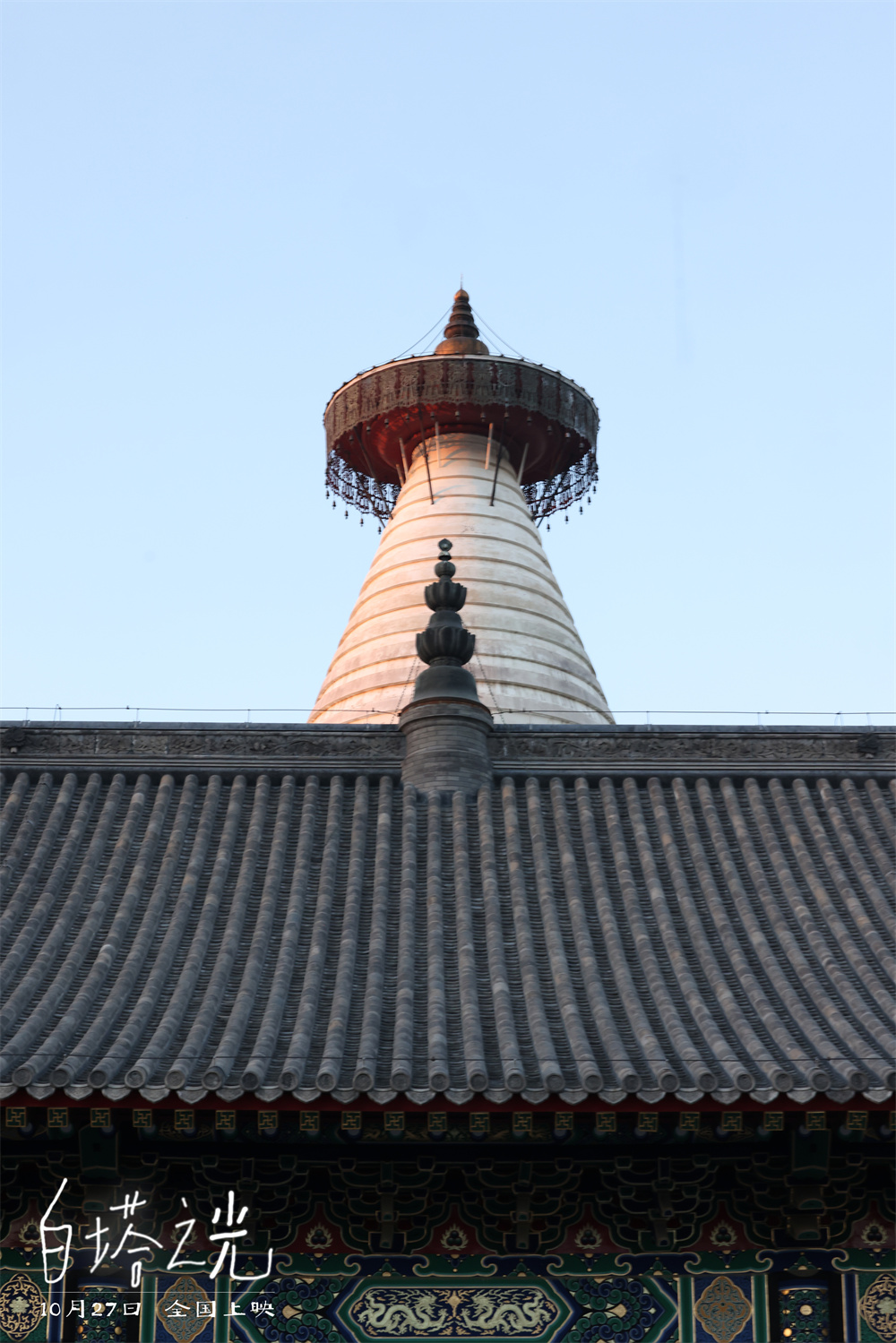
White Pagoda and Miaoying Temple
"Xin Baiqing has a kind of old Beijinger's 'not in a hurry'"
The Paper : Xin Baiqing plays Gu Wentong. This is your second collaboration after "The Long Confession." What kind of qualities do you value in him?
Zhang Lu : Xin Baiqing has the "not in a hurry" of an old Beijinger. When your rhythm is very fast, the changes of time on you will be masked. As for a person who is not in a hurry, the traces of time are heavier on his body. This kind of person who seems to be taking his time has a closer relationship with the past than a person who keeps running forward. This time he plays Gu Wentong, a Beijinger who has always lived in an alley. He usually wears a pair of "Pian'erlan" (loafers) when he goes out. In my opinion, the space of Hutong life has not changed. After all, times have changed. The number of people will change to some extent, but their life rhythm and space have completely changed. The area is still different, just like the brother-in-law played by Wang Hongwei in the film. , he lives in Wangjing, and the pace is obviously much faster.
The Paper : "The Light of the White Tower" does not clearly explain the time point of the story, but through some details, the audience can still understand it. For example, when Gu Wentong was communicating with Wen Hui, when he heard that her surname was Ouyang, he opened his mouth and said "Ouyang Hai".
Zhang Lu : I avoided all calendars in the movie, but when filming last year, sometimes there were people wearing masks in the background. There was nothing I could do about it. Xin Baiqing is already 50 years old, and the character he plays in the film should be a little older than his actual age. In the scene where their old classmates reunited, Lao Mu, who was in France, participated through video. He had been away for thirty years. If the audience is careful, they can probably calculate the age of this generation. Their primary school textbooks include the text "Ouyang Hai Stops a Frightened Horse".
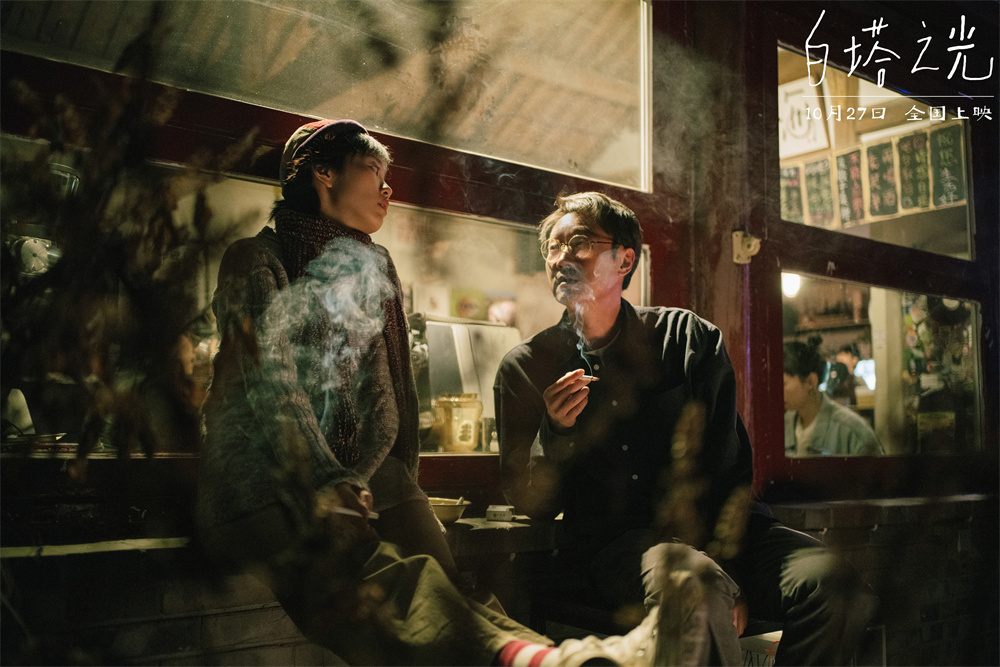
Stills from "The Light of the White Tower", Xin Baiqing and Huang Yao's first encounter
The Paper : The love or relationship between Gu Wentong and Wen Hui is still unclear, ambiguous and fruitless. You seem to be particularly willing to create the image of a man who is powerless in love. In the movie, he and Wen Hui went to the hotel next to the White Tower to check out a room for the first time, and saw the waiter reading Roland Barthes' "Lover's Discourses" - what do you think of the fusion of intellectual interest in the movie and the overall temperament of the movie?
Zhang Lu : Actually, I don’t do anything specifically for this kind of integration. In real life, they will eventually be balanced. There is a phenomenon in the publishing and film industries. Many people buy books based on the titles of the books and watch movies based on the movie titles. However, it turns out that it is not exactly what they originally thought. Gu Wentong is an intellectual. He knows that "Lover's Whispers" is a philosophy book, not a chicken soup for the soul of love. The waiter was very funny when he read this book. He said to himself, "The title of this book is quite deceiving." of."
The Paper : Your film works have had a "threesome" structure starting from "A Dream of Spring", which was also the case in your previous work "A Long Confession". In "The Light of the White Tower", between Gu Wentong, Wen Hui and Nan Ji, the emotional tension between men and women seems to be more complicated and confusing?
Zhang Lu : For the role of Nanji, she has a photography studio next to the Baita Temple, which was built by the Mongols. The actress who plays Nanji is called Nanji, and her original name is Xiao Siqin Gaowa. She is a Mongolian. In the film, Nanji also said that his ancestors participated in the construction of the White Pagoda Temple. Whether or not this is true, it makes perfect sense in Beijing.
As for the relationship between the three of them, I feel that if two people finally get together, without the relationship and sight of the people next to them, they will not be able to get together. Nanji and Wenhui are both photographers. They should have known each other for a long time, and Nanji and Wenhui's ex-boyfriends also knew each other and rented a house together. If Gu Wentong's rhythm can attract Wen Hui, he should also be able to attract Nan Ji, because the two women have similar textures and similar tastes. They all have a crush on men like Gu Wentong.
The Paper : What do you think of Gu Wentong’s middle-aged status?
Zhang Lu : I am already 60 years old, but as long as I have experienced the stage of middle age, those feelings will always be remembered. This is the most confusing and difficult stage in a person's life. It is a link between the past and the following, and there are older people and younger people. In my opinion, the time of youth may just pass by in a flash when a person looks back, but the anxiety of middle age will be unforgettable. Even when I reach 60 years old, these experiences will not completely transcend me.
The Paper : In the movie, the relationship between Gu Wentong and his father Gu Yunlai is restored gradually. You depict the still and deep emotional interaction between the two men. Their final reconciliation was accomplished with a ballroom dance and not so many words.
Zhang Lu : Based on the clues provided by his brother-in-law, Gu Wentong came to the secluded room of his father in Beidaihe for the second time - his father was exiled by the family because of unfounded indecency charges. If you know the history of the audience, you will know (last century) ) In the mid-1970s, around 1976, such things often happened in society. In fact, the son had not completely let go of this knot in his heart, so when the father and son met again, the son "interrogated" his father in his dream. Did he do that thing back then? But when the scene changed, the father was watering the flowers and the son was fast asleep on the bed. Here I used a lens to overlap the dream and reality.
As for the dance between them, humans are also animals, and I have always felt that physical communication is the real communication. Because there are lies in verbal communication, and sometimes the person who lies lies deceives himself, but the body cannot deceive others. After all, they are a father and son. The father has exiled himself because of carrying the past. When their bodies are close, their hearts are also at peace.
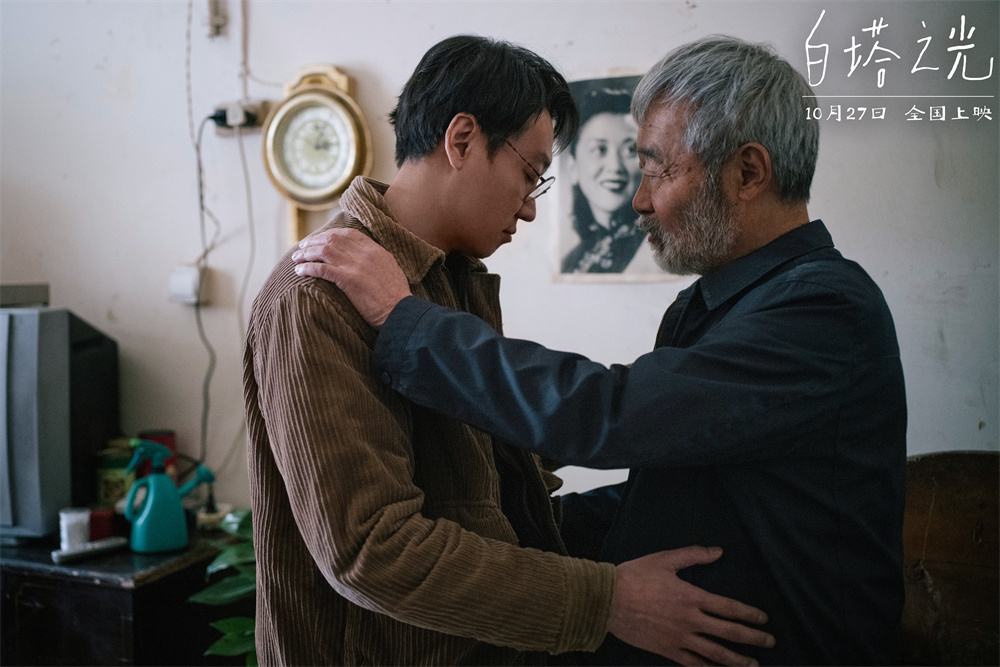
"The Light of the White Tower" stills, Xin Baiqing, Tian Zhuangzhuang and their son reunited
The Paper : I have a question. My father puts Shangguan Yunzhu’s movie in his house and the photos of celebrities hanging on the wall. Is there any connection between these and the plot?
Zhang Lu : There is no special observation. I just want to express that the father played by Tian Zhuangzhuang also had his own idols at his age. When he was young, the only female stars in the movie were Shangguan Yunzhu, Qin Yi, and Wang Danfeng. He was a fan of Shangguan Yunzhu. . I chose Shangguan Yunzhu because of her compound surname. In the movie, Wen Hui also had the compound surname Ouyang.
In the past, when we showed the elderly in movies, we tended to strip away their emotional world. This was unfair to the elderly, as if they did not participate in fan behavior similar to today's. In fact, they also had their own problems in that era. idol. This father has been living alone for so many years. His fondness for watching Shangguan Yunzhu's old movies may be a bright spot in his personal life. Director Tian Zhuangzhuang is also a very good actor. He stands there without saying a word, and there is drama in him.
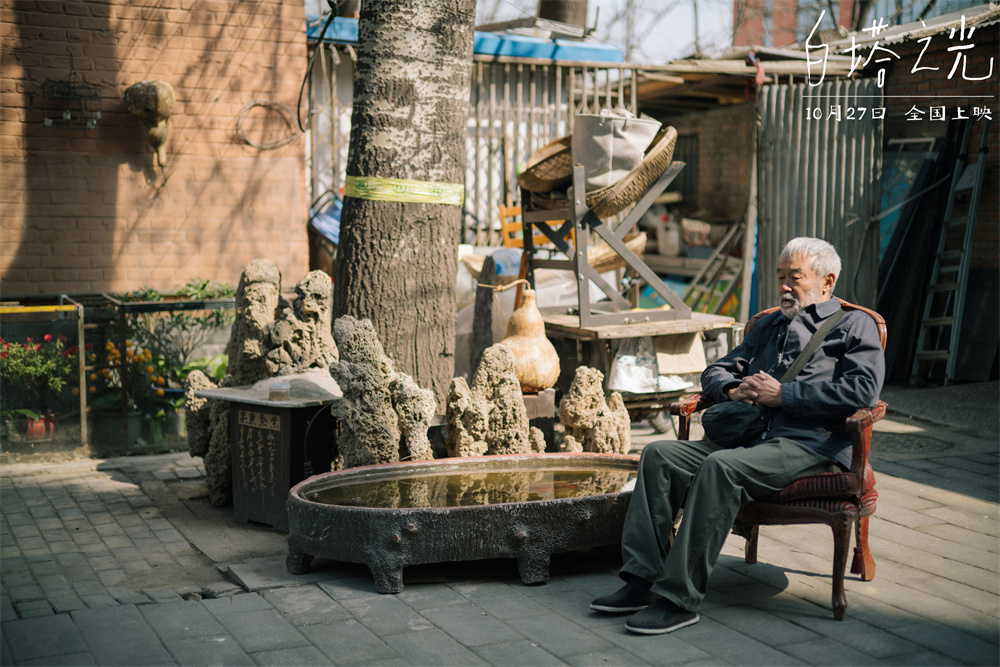
Stills from "The Light of the White Tower", Tian Zhuangzhuang sitting alone
After making this movie, "Beijing is still a mystery"
The Paper : Because of your identity and experience, in "The Light of the White Tower" we still see the collision of thinking between multiple languages. At the end of the film, Gu Wentong visits his ex-wife who is seriously ill and asks her ex-wife's current husband a question, how do you say "I love you" in Korean? The pronunciation of "SanRang" in Korean means "fool" in Xinjiang Uyghur, which constitutes an interesting contrast.
Zhang Lu : When we talk about Beijing now, we always talk about household registration. In fact, Beijing has been a place where many ethnic groups have lived together in all dynasties. The Yuan Dynasty was a minority regime, and the Qing Dynasty was also a minority regime, but Han culture has not disappeared, and all ethnic groups live here. In real life in Beijing, multiple ethnic groups are always together, and their emotions are diverse. This is very interesting. I think it is precisely because of this that Beijing can become the center, because the center is often the most complicated place.
The current husband of Gu Wentong's ex-wife is a professor who teaches Korean. In the past, you could often hear people communicating in Korean in Wangjing, where many Koreans have settled. The professor in the movie is played by Zhang Xianmin, a teacher from Beijing Film Academy. His French is very good, and he even speaks better than the French. This time, the dialogue between the two of us in the past was used as lines in the movie, but the French was changed to Korean.
"SanRang" in Korean means "I love you". How did I know that its pronunciation is the same as "fool" in Uyghur? There is a Xinjiang street in Weigong Village in Beijing. There are many Xinjiang restaurants. I often go there to eat, and I hear them say "San Rang" from time to time. I was puzzled and found out that this pronunciation means "fool" in Uyghur. These two completely different languages, because of the exact same pronunciation of a word, happen to be the true concept of love when put together. There are many similar coincidences in our lives, it just depends on whether you are willing to observe them.
The Paper : The scene of Gu Yunlai flying a kite on the beach in Beidaihe was very beautiful. It also formed a certain reflection with the poem "This is Beijing at 4:08" written by Gu Wentong's daughter Shizhi. There is a line in that poem, "At this time, my heart became a kite, and the string of the kite was in my mother's hands." Including the sentence, "Beijing is moving slowly under my feet." This also reflects the fate of the characters. What do you think of the use of poetry in this film?
Zhang Lu : There is this kind of observation, but the bigger starting point is Gu Wentong, played by Xin Baiqing. He turned out to be a poet, but he was not that successful. I have always believed that as long as a person has written poetry, his rhythm will slow down and take on the rhythm of poetry. The poetry collection was "Poems for Children" selected by Bei Dao, and I did not feature the cover. This book sold very well, and many parents bought it to read to their children, but the poems in it were not what they imagined as "poems for children."
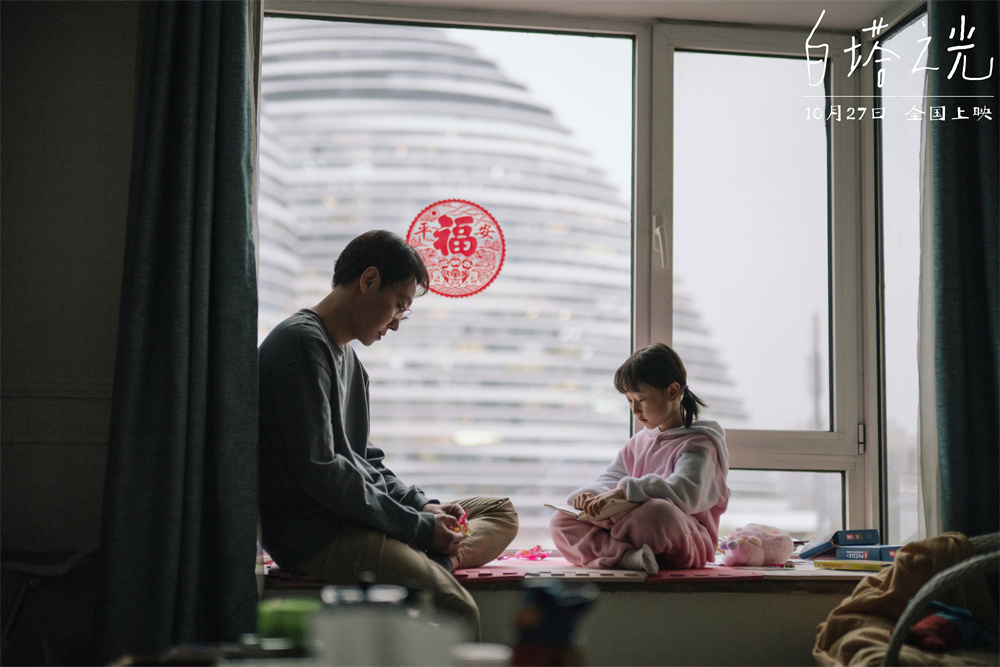
"The Light of the White Tower" stills, father and daughter read poetry
The great thing about Bei Dao is that his selection of poems does not focus on the current situation of a child, but tells the children through these poems the various difficulties that the child will encounter when he grows up. I quoted two poems in the film, in addition to "This is Beijing at 4:08" by Shizhi, and one of Bei Dao's own poems, "A Bundle". I am not choosing poems based on my own taste, but there is such a book, and it has a huge influence. Parents in many families buy it and read it to their children. This is the reality of our lives.
The Paper : Li Shutong's poem "Autumn Willows", as a kind of chant, appears again in "The Light of the White Tower" after "The Long Confession". Why do you have a special liking for this song?
Zhang Lu : There is no copyright issue with this song (laughs). In "The Long Confession" Yanagawa himself sings, showing one's emotions. But in "The Light of the White Tower" it was Wen Hui who taught a group of children in the orphanage to sing. Regarding farewell, in addition to "Autumn Willows", another poem "Farewell" by Li Shutong is more famous, and was used in the movie "Old Things in the South of the City". And it's very strange, whether it's "Farewell" or "Autumn Willows", similar sad and panic-stricken farewell songs, no matter whether it is sung by Pu Shu or any celebrity, they are not as moving as children's songs. A group of innocent children who have never experienced such a parting can make all adults moved when they sing it.
The Paper : You once said that you don’t like to smell some kind of narrative based on literature in movies, but you want to return to the original intention of audiovisual. I saw a literary consultant on the creative list of "The Light of the White Tower". Could you please introduce his role? In addition, during the creation process, what kind of communication did you have with the producer, Director Huang Jianxin?
Zhang Lu : Li Xun, the literary consultant for this film, is a researcher at the China Film Archive and has retired. He is an old Beijinger. We mainly chatted about our observations and feelings about Beijing. It was a kind of casual cooperation. We need to be vigilant when literary narratives are directly introduced into movies, but when literature is a very broad expression of life, it is required by any art form.
Director Huang Jianxin is my big brother. After "The Long Confession", we have become closer and we often chat for a long time when we meet. He is older than me, but I found that his creative mentality is younger than mine, and his vision is very broad. Every time I see him, I feel rejuvenated.
The Paper : I saw someone comparing "The Light of the White Tower" to your love letter to Beijing. I would like to know how you define the status of this film in your own work sequence?
Zhang Lu : The so-called "love letter" is what others call it. I really want to explore and present Beijing, the city where I have lived for so long, and its changes in people's emotions, texture, and rhythm amidst the great changes of the times. Therefore, I turned on the camera and recorded my observations and thoughts. No matter what kind of movie it is, it is documentary, but after filming, I found that I still don’t understand this city, and I may never understand it. I just filmed its current texture, which gave me a lot of Feeling relieved. But Beijing remains a mystery, just like my father, and perhaps always will be.


